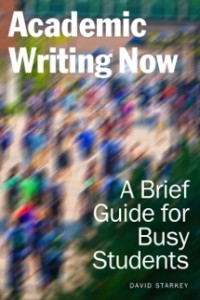The Helpful Suggestions of Academic Writing Now
 Broadview’s latest book on English composition, Academic Writing Now: A Brief Guide for Busy Students by David Starkey, invites the student reader to write throughout—and all over—its pages.
Broadview’s latest book on English composition, Academic Writing Now: A Brief Guide for Busy Students by David Starkey, invites the student reader to write throughout—and all over—its pages.
Many students write in their books as a method of memorization: textbooks are a haven for highlighters; grammar guides have lines for filling out exercises; a favorite novel is dog-eared and marked up in pencil. The printed page and the writing hand have a relationship as old as reading itself. To reinforce this connection, the conclusion of each chapter of Academic Writing Now includes two sections, one entitled “Questions and Suggestions FOR You,” and the other “Questions and Suggestions FROM You.” The former provide an opportunity to reflect on the chapter just completed, and the latter give space for questions that remain after completing this reflection.
The refrain throughout Academic Writing Now is that effective writing requires practice and repetition; the invitation to write helps the student worry less about being perfect the first time, and it encourages them instead to focus on writing as a process that happens daily. To balance this emphasis on daily writing, Starkey offers up some “Timesaving Tips” to help save students’ time. After all, a good grade is not earned purely on the basis of the number of hours a student works; it also results from how effectively his or her time is spent.
For example, Starkey writes:
 Timesaver Tip: Don’t go down with a sinking ship. Most drafts can be salvaged, but not all of them. If you realize your essay has gone very wrong, make major revisions or start over entirely. This may seem counterintuitive, but it’s a much smarter use of your time to begin work on something new that you can actually turn in rather than laboring for hours on a piece of writing that — for whatever reason — seems destined to fail.
Timesaver Tip: Don’t go down with a sinking ship. Most drafts can be salvaged, but not all of them. If you realize your essay has gone very wrong, make major revisions or start over entirely. This may seem counterintuitive, but it’s a much smarter use of your time to begin work on something new that you can actually turn in rather than laboring for hours on a piece of writing that — for whatever reason — seems destined to fail.
Academic Writing Now also offers a series of “Avoid This Common Error” sections where Starkey tries to steer his student reader away from essay-ruining missteps:
 Avoid This Common Error: “In today’s society….” Unable to think of any other way to begin their essays, students often use the first thing that pops into their heads. One of the most common fallback openings is “In today’s society.” Not only is this a cliché of academic writing — one that is guaranteed to make your instructor cringe — it is entirely unnecessary. Unless you indicate differently, your reader will always automatically assume you are talking about “today’s society.”
Avoid This Common Error: “In today’s society….” Unable to think of any other way to begin their essays, students often use the first thing that pops into their heads. One of the most common fallback openings is “In today’s society.” Not only is this a cliché of academic writing — one that is guaranteed to make your instructor cringe — it is entirely unnecessary. Unless you indicate differently, your reader will always automatically assume you are talking about “today’s society.”
The conversational style of Academic Writing Now is especially well-suited for undergraduate students approaching writing at the post-secondary level for the first time. “David Starkey delivers clear, ordered advice in a voice so familiar and colloquial that anyone’s anxiety about this often rigid, academic subject will start to calm,” Richard Guzman of North Central College says in his review of the text. “[W]hat I like best is that underneath it all he encourages students to keep creativity and poetic insight alive even as they tackle the challenge of writing rigorous, scholarly papers.”
We encourage students interested in improving their writing to check out Academic Writing Now. Use the discount code broadview20% at checkout for 20% off the bound book. Professors who are interested in reviewing the text for course adoption can request a complimentary examination copy.
Don’t forget about our other latest and greatest composition titles:
Broadview Guide to Writing, 6/e
Academic Writing Now, Real World Topics
Essays and Arguments
Enjoy the summer! The fall will return soon, and with it the restart of the new academic session.
